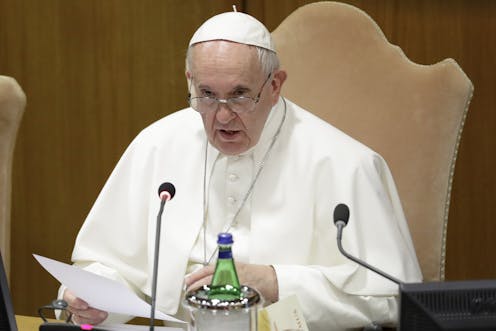The Catholic Church is tightening rules on reporting sexual abuse – but not swearing off its legal privilege to keep secrets
- Written by Christine P. Bartholomew, Associate Professor of Law, University at Buffalo, The State University of New York

Pope Francis recently changed the Catholic Church law[1], making it mandatory for clergy to report sexual abuse to church superiors. In the past, such reporting was left to the discretion of a priest or nun.
Pope Francis’ proposal is an effort to address gaps in the regulatory process of the church, which has been accused of shielding clergy sexual abuse. It provides a process to report allegations up the pipeline.
As a scholar of law[2] I worry that it fails to address what the church will do with that information.
To date, religious organizations, such as the Catholic Church, have adopted inconsistent positions on whether, and to what degree, they should share information necessary for legal action.
Clergy across various religions, ranging from Christians to Catholics to Muslims to Jews, are willing to share evidence in cases of violent crimes, such as murders. But when the evidence pertains to clergy misconduct, namely sexual abuse, the tide changes.
Clergy privilege plays a key role in what information is shared.
What is clergy privilege?
Every state in the U.S. recognizes a clergy privilege[3], which shields clergy from forced disclosure of confidential spiritual communications. This protection extends to confessions but also to conversations that provide solace, comfort and aid.
Often, courts rely on clergy to decide whether the requirements of the privilege apply in a given case. In my research, I reviewed[4] more than 700 judicial decisions addressing clergy privilege in a variety of cases, ranging from murder to sexual abuse.
These decisions show how clerics decide to testify on a case-by-case basis. In doing so, they share confidences that are protected under broad clergy privilege statutes.
Particularly in cases involving violent crimes, clergy often apply their own narrow definitions of what is privileged. In State v. Cartmell[5], for example, a chaplain testified about a communication with the defendant in a murder case.
According to the defendant, he and the chaplain were praying together during this communication, which could be viewed as a spiritual activity covered under the clergy privilege statute. It was during this time that the defendant allegedly confessed to the murder.
The chaplain contended before the court that the confession was not spiritual and thus not covered by clergy privilege. He said the defendant was only “trying to make peace, sense of what had happened.”
In another such case, Morales v. Portuondo,[6] a Catholic priest received a murder confession. The murderer was not convicted. Rather, two others were sentenced. The priest struggled for years over whether to break the seal of confession. With the assistance of officials at the diocese, he opted to disclose.
The priest revised his characterization of the communication from sacramental confession to a “heart-to-heart.” With this minor reframing, the priest unilaterally decided he could share the confession with officials.
In short, when clergy want to testify, they find ways to remove the shroud of confidentiality.
In divulging these communications, clergy are not necessarily acting unethically. Rather, clergy have numerous duties[7] that compete with canonical obligations of confidentiality – duties to protect their congregation, advance justice and to help wrongdoers down a path of repentance.
A different stance on clergy abuse?
Notably, though, my research shows this trend often reverses when the communication involves clergy abuse.
In many church sex abuse cases, churches have asserted privilege to shield communications[8] by alleged perpetrators to their superiors and fellow priests. In some lawsuits for alleged abuse, clergy claimed virtually every document between a cleric and superior was inviolably protected.
For example, in Hutchinson v. Luddy[9], the plaintiff, an alleged victim of sexual assault by a Catholic priest, sought documents relating to the church’s investigation of wrongdoing. These documents included reports of alleged sexual involvement with minor male children by priests in the diocese.
The church categorically refused, claiming privilege to shield this information.
This protectionist approach appears across many denominations in church sex abuse cases. This includes cases involving Methodist, Episcopalian and Roman Catholic clerics[10]. Rather than sharing information about alleged wrongdoing with law officials, members of the church[11] allegedly covered up the accusations[12].
A grand jury report revealed the scale of the problem when it found last year that bishops and other leaders in six of Pennsylvania’s eight Catholic dioceses had covered up child sexual abuse by more than 300 priests over a period of 70 years. Some dioceses still shield the names of alleged abusers[13].
Only a starting point
In my view, the last 200 years of clergy privilege decisions[14] show the need for external oversight to avoid this selective approach.
Clergy elect when and how much information about alleged wrongdoing to divulge. When the alleged wrongdoer is one of their own, the tendency, I would argue, may be toward less transparency, not more.
Pope Francis’ new law is a step in the right direction. It urges more information sharing and more oversight. But the church needs to be careful not to play both the judge and the jury.
References
- ^ changed the Catholic Church law (www.theatlantic.com)
- ^ scholar of law (scholar.google.com)
- ^ recognizes a clergy privilege (digitalcommons.law.buffalo.edu)
- ^ I reviewed (digitalcommons.law.buffalo.edu)
- ^ State v. Cartmell (www.tncourts.gov)
- ^ Morales v. Portuondo, (law.justia.com)
- ^ numerous duties (books.google.com)
- ^ shield communications (www.washingtonpost.com)
- ^ Hutchinson v. Luddy (caselaw.findlaw.com)
- ^ Methodist, Episcopalian and Roman Catholic clerics (digitalcommons.law.buffalo.edu)
- ^ members of the church (buffalonews.com)
- ^ covered up the accusations (www.texasmonthly.com)
- ^ shield the names of alleged abusers (buffalonews.com)
- ^ last 200 years of clergy privilege decisions (digitalcommons.law.buffalo.edu)
Authors: Christine P. Bartholomew, Associate Professor of Law, University at Buffalo, The State University of New York

